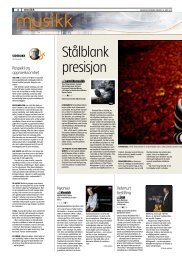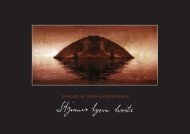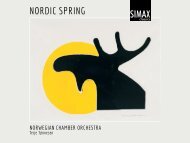ELLEN UGELVIK, PIANO
ELLEN UGELVIK, PIANO
ELLEN UGELVIK, PIANO
You also want an ePaper? Increase the reach of your titles
YUMPU automatically turns print PDFs into web optimized ePapers that Google loves.
lder og gleder<br />
den foregriper<br />
r instrumentet<br />
g gjennom en<br />
erstemmen og<br />
også en nær<br />
ountering the<br />
e, i og med at<br />
unnet fra det<br />
Lachenmann<br />
enn å være en<br />
, har Jaksjø<br />
videre, og har<br />
tsikt langt inn i<br />
Encountering the Imaginary<br />
The Sirens: it seems they did indeed sing, but in an<br />
unfulfilling way, one that only gave a sign of where the<br />
real sources and real happiness of song opened. Still,<br />
by means of their imperfect songs that were only a<br />
song still to come, they did lead the sailor toward that<br />
space where singing might truly begin. They did not<br />
deceive him, in fact: they actually led him to his goal.<br />
But what happened once the place was reached?<br />
What was this place? One where there was nothing<br />
left but to disappear, because music, in this region of<br />
source and origin, had itself disappeared more<br />
completely than in any other place in the world: sea<br />
where, ears blocked, the living sank, and where the<br />
Sirens, as proof of their good will, had also, one day, to<br />
disappear.<br />
What was the nature of the Sirens’ song? Where did<br />
its fault lie? Why did this fault make it so powerful?<br />
Some have always answered: It was an inhuman<br />
song–a natural noise no doubt (are there any other<br />
kinds?), but on the fringes of nature, foreign in every<br />
possible way to man, very low, and awakening in him<br />
that extreme delight in falling that he cannot satisfy in<br />
the normal conditions of life. But, say others, the<br />
enchantment was stranger than that: it did nothing but<br />
reproduce the habitual song of men, and because the<br />
Sirens, who were only animals, quite beautiful<br />
because of the reflection of feminine beauty, could<br />
sing as men sing, they made the song so strange that<br />
they gave birth in anyone who heard it to a suspicion<br />
of the inhumanity of every human song. Is it through<br />
despair, then, that men passionate for their own song<br />
came to perish? Through a despair very close to<br />
rapture. There was something wonderful in this real<br />
song, this common, secret song, simple and everyday,<br />
that they had to recognize right away, sung in an<br />
unreal way by foreign, even imaginary powers, song<br />
of the abyss that, once heard, would open an abyss in<br />
each word and would beckon those who heard it to<br />
vanish into it.<br />
This song, we must remember, was aimed at sailors,<br />
men who take risks and feel bold impulses, and it was<br />
also a means of navigation: it was a distance, and it<br />
revealed the possibility of traveling this distance, of<br />
making the song into the movement toward the song,<br />
and of making this movement the expression of the<br />
greatest desire. Strange navigation, but toward what<br />
end? It has always been possible to think that those<br />
who approached it did nothing but come near to it, and<br />
died because of impatience, because they<br />
prematurely asserted: here it is; here, here I will cast<br />
9

















